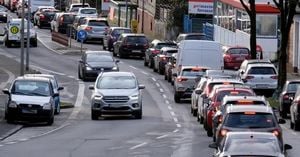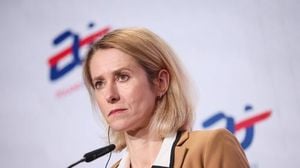The Lebanese economic crisis has dramatically transformed the daily lives of its citizens, forcing many to turn to second-hand clothing markets as their purchasing power dwindles. Since 2019, Lebanon has been grappling with soaring inflation and currency devaluation, leading to staggering poverty rates.
According to sources like International Information, about 70% of the Lebanese population now lives under conditions of extreme poverty, with families cutting back on essentials—clothing has become a luxury for many. To make ends meet, creative solutions have arisen; one of the most visible is the proliferation of second-hand clothing shops, which have spread across various neighborhoods, especially poorer districts. These markets offer peace of mind for those who can no longer afford new clothes, presenting them with the chance to maintain dignity through affordable fashion.
"With the economic crisis getting worse, many Lebanese have moved to buying second-hand clothes to cope with rising prices," reported Ruba Abou Fadel for Al-Diyar, emphasizing the shift toward this form of shopping.
This trend has seen the emergence of boutiques and stores selling clothes by the kilo—a drastic shift from pre-crisis shopping habits. Once frowned upon, wearing second-hand has become not only acceptable but trendy. Mohammed, the owner of one popular store selling clothes by the kilo, noted, "Today, the second-hand clothing market has become largely accepted across all social classes." He elaborated on how the stigma attached to shopping for used items has faded.
Hana, who works in the private sector and is a mother of three, echoed similar sentiments: "Buying second-hand can help people dress well without spending too much, especially when the price of new clothes is unaffordable." This adaptability to economic hardships showcases how individuals are innovatively coping with difficult circumstances.
Yet, the shift to second-hand shopping does not come without caution. Health experts are warning about potential risks associated with buying used clothing. Dr. Rana Khoury raised concerns about hygiene, stating, "There are risks involved with buying second-hand clothes, particularly pertaining to health, as they can carry bacteria if not properly sanitized." She advocated for thorough cleaning of these items before use to mitigate any health risks, highlighting the need for consumer awareness.
While the rise of the second-hand market reflects the current economic crisis, it also signifies the resilience of the Lebanese people. Many have discovered creative ways to navigate financial hardship, finding solace and affordability amid unsustainable living costs. This shift is gaining traction across various social classes, breaking down previous stigmas associated with used clothing, with demand continuing to grow.
"People from different social backgrounds now join the crowds at second-hand stores," said Mohammed. "Buying second-hand is not just for the poor anymore; even those seeking brand-name items at lower prices browse these stores." The expanded acceptance and adaptability demonstrate the community's spirit and determination amid socioeconomic challenges.
Despite the inspiring perseverance shown by Lebanese citizens, the economic situation remains dire. The hope for new political leadership and eventual recovery lingers; many are advocating for the establishment of responsible governance as they yearn for fundamental changes. Political analysts argue these transformations are pivotal for restoring public trust and financial stability.
The situation encapsulates not only the current economic distress but also reflects the dedication of Lebanon's citizens to finding solutions and enduring through tough times. Communities continue to rally together to support each other, seeking affordable ways to maintain their lifestyles.
While the second-hand clothing trend serves as a temporary fix, it emphasizes the necessity of broader economic reforms to reinstate sustained livelihood for all citizens. The future may seem uncertain, but as long as the Lebanese people hold onto hope and innovation, there’s potential for recovery and renewal.



